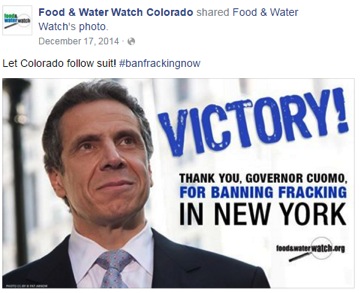
Environmental activists recently made headlines by abandoning a statewide ballot measure that would ban hydraulic fracturing – and the oil and natural gas production it makes possible – all across Colorado. Even so, the activists warn they “still have plenty to work with.” Several more ballot measures are in the works to legalize local energy bans and prohibit drilling across huge areas of the state’s existing oil and gas fields.
Those measures will be cloaked in the rhetoric of giving more control to local governments and residential neighborhoods, just like the last set of anti-fracking measures in 2014. But the objective is the same: Imposing a New York-style fracking ban that will wipe out one of the Colorado’s most important industries.
We know this because the activists have said it themselves. When Gov. Andrew Cuomo (D) announced the New York fracking ban in late 2014, anti-energy activists in Colorado were overjoyed, according to Energy In Depth. Colorado representatives of the national anti-fracking group Food & Water Watch trumpeted: “Let Colorado follow suit!” Frack Free Colorado, a state-level group created by Food & Water Watch and other national activist organizations, asked: “What do you say Colorado? Let’s do this!” Then, in early 2015, Coloradans Against Fracking – yet another group created by national activists – demanded the New York ban should be copied here. “If Governor Cuomo can ban fracking in New York, Governor Hickenlooper can do it in Colorado,” the group said.

That’s an astonishingly weak argument. Even Michael Bloomberg, the former mayor of New York City who loves to meddle in Colorado politics, opposes Gov. Cuomo’s fracking ban. Likewise, California Gov. Jerry Brown (D) – a hero to the environmental movement for decades – has flatly refused to ban fracking. A few years ago, Gov. Brown even said anti-fracking activists “don’t know what the hell they’re talking about.”
Far from being an example to follow in Colorado, New York fracking ban was a victory of far-left politics over science. State environmental regulators twice concluded, in 2009 and 2011, that hydraulic fracturing could be used safely to develop New York’s untapped shale gas reserves. But Gov. Cuomo caved under pressure from a well-funded, well-organized anti-fracking campaign. He overruled those earlier findings and killed New York’s shale-gas industry before it had a chance to start.
To justify this decision, the Cuomo administration produced a report that relied heavily on the work of activists who oppose oil and gas development. In one case, Cuomo officials actually cited a paper from the national anti-fracking group Earthworks which hadn’t been peer-reviewed. In another case, the Cuomo administration used a number of articles from a left-wing journal whose authors include “environmentalists in their many habitats” and “activists on the streets.”
Perhaps the worst case of politics trumping science came from a journal article claiming dangerous levels of air pollution near oil and natural gas wells. The article, waved in front of the cameras by Gov. Cuomo’s health commissioner, was also a complete creation of anti-energy activists. It was researched and written by members of oil and gas opposition groups, and in a stunning breach of scientific codes of conduct, the article was also peer-reviewed by activists who concealed their bias from the public. In fact, one of the reviewers was the co-founder of a group called New Yorkers Against Fracking, the state’s leading shale-gas opposition group.
The activists needed to subvert the peer-review process because their research methods were, in a word, junk. Across several states, the activists actually used buckets lined with plastic bags to take air samples. Some of these “bucket brigade” samples were taken in northern Colorado as part of a fundraising effort. “If something comes up that is concerning, maybe we can get more funding,” a local activist said before going out to take samples near Erie. Years earlier, the Colorado Department of Public Health and Environment discredited the bucket-brigade method for its “serious technical deficiencies.” And years before that, one of the activists who pioneered the technique admitted it was all about politics. “The Bucket Brigade is not a scientific experiment,” he wrote in a 2006 activist training manual. “Our focus is on organizing. We use science, but only in the service of organizing.”
No matter what the anti-fracking activists in Colorado propose for the statewide ballot, or push in the state legislature, or demand at the local level, it all comes back to the same simple goal. They want to make Colorado just like New York, a state with so many problems that the competition for economic aid from the Cuomo administration has been nicknamed “The Hunger Games.” With all due respect to the Empire State, does anyone seriously think that’s a good plan for Colorado?
Simon Lomax is an associate energy policy analyst with the Independence Institute and a consultant who advises pro-business groups. From 2004 to 2012, he was a news reporter covering energy and environmental policy in Washington, D.C. Contact him at simon@i2i.org


